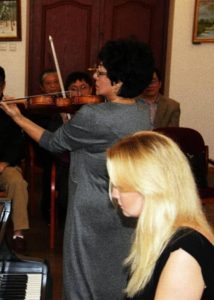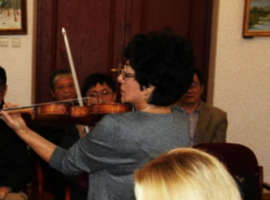2017 Concert for artificial inteligence scientists happened in Fangorówka mannor-house.
Artificial intelligence (AI) is increasingly being used in the music industry, and it is having a significant impact on the way that music is created, produced, and consumed.
Having artificial intelligence scientists at our concert can bring a unique and valuable perspective to the experience of beauty and inspiration. These experts are at the forefront of cutting-edge technology, constantly pushing the boundaries of what is possible. Their presence at the concert allows for a fusion of art and science, creating an intellectually stimulating environment.
Artificial intelligence scientists have a deep understanding of algorithms and patterns, which can enhance their appreciation of music and performance. They can notice intricate details in compositions that others might miss, and appreciate the technical skill involved in creating such complex melodies. Their analytical mindset can provide a fresh and unique perspective on the beauty and intricacies of music.
Furthermore, having artificial intelligence scientists at our concert can also encourage innovation. By exposing them to different forms of artistic expression, they may come up with new ideas or approaches that bridge the gap between technology and art. This cross-pollination of ideas can lead to ground-breaking advances in both fields.
In summary, having artificial intelligence scientists at our concert adds a layer of intellectual depth and innovation to the experience. Their presence enriches the appreciation of beauty and inspiration, while potentially sparking new ideas at the intersection of technology and art.
Interesting stuff AI could bring to music
Here are a few ways that AI is intersecting with music:
- Music generation. AI algorithms can be trained to generate music by learning from existing musical data and creating original compositions based on that information. This can be used to create music for film, television, video games, and other applications.
- Music production. AI can be used to automate certain tasks in the music production process, such as mixing and mastering, which can save time and improve efficiency.
- Music recommendation. AI can be used to recommend music to users based on their listening habits and preferences. This is commonly used by music streaming services to help users discover new artists and tracks.
- Music performance. AI can be used to create music in real-time, either by generating original compositions or by improvising based on input from a human performer.
Overall, AI is having a significant impact on the music industry, and it is likely that we will see even more applications of AI in music in the future.

At the outset of the new school-year 2017/2018 our Author’s Musical School UNISONO met a pleasant surprise
We were invited by the Directors of the Botanic Garden of the Polish Academy of Sciences in Powsin to deliver a musical setting for the final meeting of the Polish and Taiwan scientists visiting Warsaw.
The Concert was performed on the 20th October 2017 in a picturesque Fangorówka mannor-house in the Botanic Garden where musicians of our School played works by Polish composers.
Performances
Juvenile violinist, Ella Bai – a student of Zofia Zwolińska – performed Cantabile by Krzesimir Dębski:
Director of the UNISONOI Musical School – violinist Zofia Zwolińska – played Concertino by Grażyna Bacewicz, and, at the end of the Concert,
Teacher of our School – pianist Magda Lewandowska performed with virtuosity Grand Polonaise in E-Flat Major op. 22 by Frederic Chopin.
Our musicians were warmly applauded by the audience.
Conclusion: Future Trends for Artificial Intelligence In Scientific Research
Artificial Intelligence has the potential to revolutionize the fields of biology, medicine and education. It can help scientists by providing them with new insights on how cells are created and how they work. It can also help doctors diagnose diseases better and more quickly. AI is not just limited to medicine, it also has a lot to offer in the field of education as well. The technology can be used as an educational assistant for students and it can also help teachers by giving them new ways of teaching their classes.
AI has the potential to revolutionize medicine in the future. It can help doctors diagnose patients, find cures for diseases, and make better decisions. AI can also help in the field of biology by making predictions that would have never been possible before. In education, AI will be able to provide personalized lessons for students based on their individual needs and challenges.
Artificial inteligence scientist are crucial
Artificial intelligence (AI) scientists are crucial to the field of AI and its development. These professionals conduct research, develop algorithms and technologies, and apply AI solutions to various challenges and problems. They work on a wide range of tasks, including natural language processing, machine learning, computer vision, and robotics, among others.
AI scientists often hold advanced degrees in fields such as computer science, mathematics, and engineering, and they may work in academia, industry, or government organizations. They may be involved in the development of cutting-edge AI technologies, the creation of new AI applications, or the study of the ethical and societal implications of AI.
Scientists play a critical role in the field of AI, and their work is shaping the future of technology and its impact on society.
Machine learning researchers are at the forefront of the field of artificial intelligence, working to advance the state of the art in AI research and development. They are responsible for developing and implementing new algorithms and technologies that can be used to solve complex problems and challenges.
Experts may work on a wide range of tasks, including natural language processing, machine learning, computer vision, and robotics. They may also be involved in the development of AI applications for industries such as healthcare, finance, and transportation, among others.
In addition to conducting research and development, AI scientists may also be involved in the study of the ethical and societal implications of AI. They may work to ensure that AI technologies are developed and used in a responsible and ethical manner, and they may be involved in discussions about the potential impacts of AI on society and the economy.
True scientists are highly skilled professionals who are crucial to the field of AI and its ongoing development. Their work is helping to shape the future of technology and its impact on society.
Artificial Intelligence can help music evolve
With AI, musicians can explore new sounds, create unique compositions and even enhance live performances.
One of the most exciting applications of AI in music is its ability to assist in composition. AI algorithms can analyse vast amounts of music data, understand patterns and structures, and generate original compositions based on specific styles or genres. This opens up endless possibilities for musicians to experiment with new melodies, harmonies and arrangements that they may never have considered before.
AI can also be a powerful tool to enhance the creative process. Using machine learning algorithms, AI systems can provide real-time feedback and suggestions to musicians as they compose. This kind of assistance can help artists overcome creative blocks, spark new ideas and refine their work in ways that were previously unimaginable.
AI can also enhance the live music experience. Through advanced machine learning techniques, AI systems can analyse audience reactions in real time and dynamically adjust the performance accordingly. This creates a more immersive and personalised experience for each listener, as the music adapts to their preferences and emotions.
But it’s important to note that while AI has immense potential in music, it’s still a tool that works best when combined with human creativity and intuition. The human touch is what gives music its emotional depth and connection. AI should be seen as a collaborator rather than a replacement for human musicians.
In conclusion, AI has the power to revolutionise music by helping artists explore new sonic territories, providing creative assistance and enhancing live performances. As the technology continues to advance, we can expect more exciting developments at the intersection of AI and music.

We were also asked to musically cooperate with the the Botanic Garden in the future. We welcomed that with pleasure.

